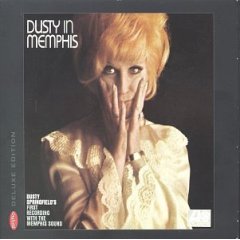 Dusty Springfield
Dusty SpringfieldDusty In Memphis
Mercury, 1969
I was born in the American South (Kentucky - I don't remember it) and I'm moving to London after Christmas, so I suppose it makes sense that my favorite soul album was recorded by a British pop singer in Memphis.
Or maybe there's no connection there at all. But there is something inexplicable that draws me to this album.
Of course, a lot of its appeal is quite explicable - a great vocalist pushing herself in a new direction and recording a set of top-notch songs with an excellent studio band. I guess Dusty herself was a bit freaked out by the idea of recording in Memphis - they were known for gritty R&B, and her specialty was "big ballady things." And the band, The Memphis Sound, worked in a way she was totally unaccustomed to. Rather than laying down arrangements ahead of time, they worked the songs out organically with the vocalist in the room. As a result, the backing vocals by The Sweet Inspirations are woven right into the fabric of the songs and the instrumentation feels perfectly natural.
Maybe this non-traditional recording approach is what gives the album that extra something special - that makes it feel like more than just a good vocal pop album. I think part of the magic, too, is that Dusty brings something unique to soul material - and that is vulnerability and restraint. I'm sure you've heard "Son of a Preacher Man" plenty of times before - on oldies radio, in the Perkins' bathroom, in Pulp Fiction - but take another listen. The tune is pretty good, but it's Dusty's vocal and the deft arrangement that take it to the next level. The lightness and fragility of the verses just makes the huge hook of the chorus sink in that much deeper (I dare you not to sing along with the Sweet Inspirations on that one). It's telling that Aretha Franklin actually turned this song down before hearing Springfield's version.
My personal favorite of the album, though, is the dramatic, swirling "Windmills of Your Mind," an all-out technicolor ballad. It's big-screen psychedelic touches are perfectly dated - rather than detracting from the song, they make it all the more charming. It's also perfectly suited to Springfield's strengths, slowly swelling from a hushed whisper in her lower register to some all-out soulful belting when the drums finally kick in at the end.
Still, despite all of the pieces coming together so perfectly, I feel like this album should get boring. I mean, it's so immediately accessible that it hardly sounds revolutionary or challenging. And it's not - it's just extremely entertaining while still being convincingly emotional, delivering on all of the promises of what pure pop music should be. This is perfect for those days when I get depressed because it seems like everything's already been done, that there's no way to push popular music further. It serves as a gentle reminder that, even within the confines of middle-of-the-road pop, it is always possible for an artist to extend herself and create something singular.
2 comments:
'son of a preacher man' is undeniable. i had never heard it before pulp fiction, and it pretty much blew me away for pure hook power.
yeah, cake for sure doesn't have a monopoly on speak-singing (and there isnt much similarity) but for some reason the comparison lurks back in my cerebellum. and mark e. smith drives me nuts. damn.
a double date WOULD be sweet. those crazy girls.
and i just found out my pop bought us tickets to bob dylan at xcel. i mean, its the xcel, but damn, it's bob.
Yeah, I think Pulp Fiction was the first time it really jumped out at me.
I personally like the Fall quite a bit, but I don't find myself inclined to listen to them all that much. It's one of those bands where once in awhile I will just think, "Oh yeah, what about those guys?" But I never find them in frequent rotation.
That's awesome! I caught Dylan at the ballpark in Rochester about a month ago. It was great.
Post a Comment